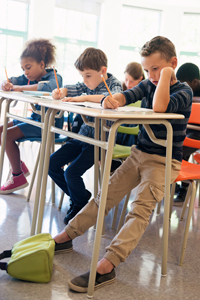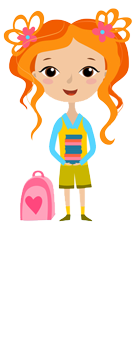What is KS2 (Key Stage 2)?
Every child’s education is split into 4 key stages, starting in Year 1 and going all the way to Year 11. Key Stage 2 (KS2) is the key stage taught in Years 3 to 6, when children are between 7 and 11 years-old.
If you'd like a PDF version of this page, simply click Key Stage 2 PDF
Is Teaching KS2 Mandatory for All Schools?
Key Stage 2 (KS2) is a component of the National Curriculum, which dictates the subjects and topics that schools should teach. This curriculum sets the standards and expectations for teachers. While state-funded local authority-maintained schools are obligated to follow the National Curriculum, independent (private) schools, free schools, and academies have the freedom to develop their own curricula. In practice, many of these schools still adhere to the National Curriculum.
Along with specifying subjects and topics, the National Curriculum also outlines the methods of assessment and the levels of achievement expected for KS2 students.
LEARN ABOUT THE BENEFITS OF LEARNING THROUGH QUIZZES
Which Subjects Are Included in KS2?
The National Curriculum prescribes the subjects that children in KS2 should study. There are 11 mandatory subjects:
- English
- Maths
- Science
- History
- Geography
- Ancient and modern foreign languages
- Art and design
- Music
- Design and technology
- Physical education (which must include swimming)
- Computing (formerly known as information and communication technology or ICT)
We have suites of learning and revision quizzes for all of the above subjects on the KS2 Section of our website.
Religious education is also a subject in the National Curriculum, and all state-maintained schools are required to provide it. The lessons should cover various religions rather than focusing on just one. However, parents can choose to exclude their children from these religious education lessons if they have objections.
Personal, social, and health education (PSHE) is an optional subject in KS2. It aims to teach children about safety, self-care, and a healthy lifestyle. PSHE also focuses on developing positive social skills and understanding others' emotions. In Key Stage 2, PSHE includes topics like puberty, relationships, and emotional health. Similar to RE, parents have the right to withdraw their children from sex education lessons.
Citizenship is another optional subject at the primary level. It introduces pupils to debating, critical thinking, politics, and law.
Key Stage 2 (KS2) spans Years 3 to 6, with children aged 7 to 11.
How Are Students Assessed in KS2?
At the conclusion of each key stage, including KS2, students' abilities are formally evaluated. Their performance is measured against the expectations set by the Government.
At the end of Year 6, when KS2 concludes, children are required to undertake a set of national tests.
Which Tests Are Administered in KS2?
The assessments conducted at the end of KS2 comprise:
- English grammar, punctuation, and spelling
- English reading (comprehending and interpreting text)
- Mathematics (arithmetic and reasoning)
- Science (covering biology, chemistry, and physics)
How Are KS2 Tests Scored?
KS2 tests are scored differently from what you might expect. Students' test scores are converted into numerical values ranging from 85 to 115. A score of 100 represents the expected standard, with scores exceeding 100 indicating performance above the expected level and scores below 100 indicating performance below the standard.
FIND OUT WHY KIDS LOVE OUR WEBSITE
What Are SATs?
The National Curriculum tests taken by primary school students are commonly known as SATs (Standard Attainment Tests). These tests primarily serve the purpose of facilitating school comparisons. Schools are ranked in league tables based on how well their students perform in SATs.
SATs have faced criticism due to concerns about the academic pressure placed on young children. It has been suggested that these tests may narrow the curriculum as schools may focus on teaching to the test to improve their rankings. In 2010, two teachers' unions, the National Union of Teachers and the National Association of Head Teachers, voted to boycott the tests, advocating for their replacement with teacher assessments. However, these efforts were unsuccessful, and SATs continue to be administered.
What Is the Importance of SATs?
While the primary function of SATs is to compare schools, it is essential for individual students to perform well. SATs results play a crucial role when secondary schools decide how to group new pupils into different classes.
What Is the 11-Plus?

While not a part of the National Curriculum, many KS2 students may need to take the Eleven-Plus (11+). Although it has become less common, it's still worth mentioning in this upper-primary education guide.
Years ago, the Eleven-Plus was a mandatory exam for children in the UK (excluding Scotland). It was administered in the final year of primary school to determine which secondary school children would attend. While most education authorities have discontinued the use of the Eleven-Plus, some still use it. For example, it is taken in Buckinghamshire, Essex, Kent, Lincolnshire, and North Yorkshire. Additionally, some other regions also use the Eleven-Plus, so parents need to check with their child's school to confirm whether the exam is required.
The Eleven-Plus aims to identify the brightest students and is a test of intelligence rather than academic ability. The exam's content varies between different local authorities and typically consists of four sections, including English, Maths, Verbal Reasoning (logical problem-solving), and Non-Verbal Reasoning (pictorial problem-solving).
Selective schools, often in high demand, may have stringent pass levels for the Eleven-Plus. Some grammar schools accept only the top 3% of applicants, while others with a more open admission policy may accept the top 30%.
KS2 outlines the subjects studied, topics covered, tests administered, and expected standards for upper primary school students.
If you want to learn more about the primary school curriculum, explore our articles on What is the Primary School Curriculum and National Curriculum In Primary Schools. These articles explain the key stages and the tests that children have to take.
Now that you have a better understanding of KS2, you might be curious about KS1 or KS3 and the early years foundation stage. You can find detailed summaries of all these stages and more on our Knowledge Bank page. It offers answers to questions about various aspects of education and provides advice for parents on topics such as children's body image and online safety, making it a valuable resource for parents.




